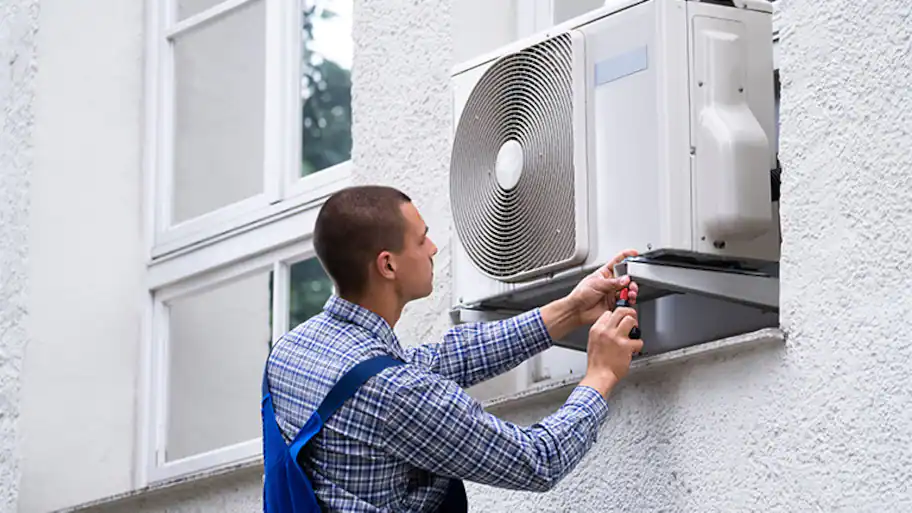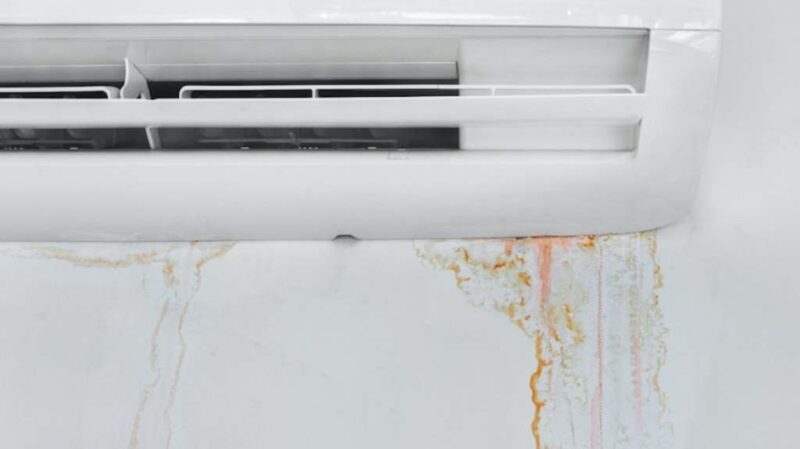A leaking air conditioner is a frustrating problem. Not only can it cause water damage to your home, but it can also indicate a deeper issue within your AC system. Fortunately, many causes of AC leaks are easily resolved with a little DIY know-how.
This guide will cover the common causes of water leaks in air conditioners, how to diagnose the problem, and steps you can take to fix the leak yourself. We’ll also discuss when it’s time to call in an HVAC professional.
Why is My Air Conditioner Leaking Water Inside?

Before jumping into solutions, let’s understand the most frequent reasons your AC might be leaking:
- Clogged Drain Line: The most common culprit. Your AC’s condensate drain line removes the moisture naturally produced during cooling. Over time, algae, dust, and debris can clog it, causing water to back up and overflow.
- Dirty Air Filter: A dirty air filter blocks airflow, potentially causing evaporator coils to freeze. When the ice melts, the excess water can overwhelm your AC’s drain pan.
- Frozen Evaporator Coils: These coils get very cold during operation. Insufficient airflow (due to dirty filters or other reasons) can cause them to freeze. The melting ice creates extra water.
- Damaged Drain Pan: Cracks or rust in the drain pan prevent it from holding water properly, causing leaks.
- Low Refrigerant Levels: Low refrigerant can also lead to evaporator coil freeze-up. The subsequent ice melt results in water overflow.
- Improper Installation: If your AC unit isn’t level, water might not drain correctly, leading to leaks.
Troubleshooting: Diagnosing the AC Leak
- Turn Off the AC: The first step is always safety. Before any inspection, shut off power to your air conditioner at the breaker panel.
- Locate the Leak: Is water dripping from the front of the unit, the back, or underneath? This helps narrow down the potential causes.
- Inspect the Drain Pan: Look for cracks, rust, or standing water. A full, overflowing pan usually indicates a clogged drain line.
- Check the Air Filter: A dirty or clogged filter needs to be replaced.
- Examine Evaporator Coils: Are the coils visibly frozen? (You’ll usually need to remove an access panel to see them).
Related: Why Does My Fridge Smell Like Chemicals?
Fixing the AC Water Leak
Here are common fixes matching the causes outlined above:
- Clearing a Clogged Drain Line:
- Locate the drain line exit, usually a PVC pipe outside near the condenser unit.
- Use a shop vac to try sucking out any blockage.
- For stubborn clogs, carefully detach the line and use a stiff wire or wet/dry vacuum to clear debris.
- Pour a solution of 1 part bleach to 16 parts water down the line to kill algae and prevent future clogs.
- Replacing a Dirty Air Filter:
- Ensure you use the correct size and type of filter for your AC system.
- Replace filters regularly (check your owner’s manual for the recommended frequency).
- Thawing Frozen Evaporator Coils:
- Turn the AC off and set the fan to “on” to help melt the ice.
- Clean or replace the air filter to prevent refreezing.
- If coils freeze repeatedly, you may have a refrigerant leak or other problem requiring professional attention.
- Repairing or Replacing a Damaged Drain Pan:
- Minor cracks can sometimes be patched with epoxy or sealant.
- Severe damage or rust usually necessitates replacing the entire drain pan.
- Addressing Refrigerant Leaks:
- Low refrigerant is always a sign of a leak. This is nota DIY fix; you’ll need to call an HVAC technician to locate the leak and recharge your system.
- Correcting Installation Issues:
- If your AC is not level, carefully adjust it using shims while checking with a level. For major installation issues, consult a professional.
When to Call an HVAC Technician
While many AC leak fixes are manageable, call a professional if:
- You can’t diagnose or fix the problem yourself.
- The leak persists after your attempts.
- You suspect a refrigerant leak.
- There are signs of damage to the AC unit itself.
Remember: Always prioritize safety when working with your AC. If in doubt, don’t hesitate to call a professional.
